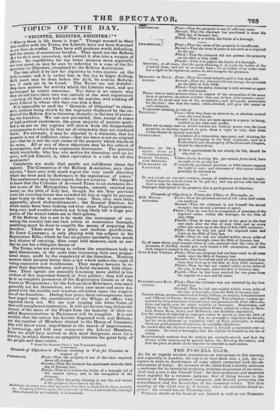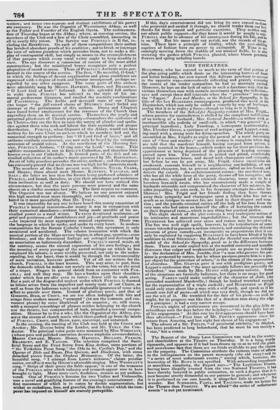THE PURCELL CLUB.
As far as regards musical associations or enterprises in this country, and especially in London, the rule is to turn them into a job, the ex- ception to unite in furtherance of some object connected with the ad- vancement of music. Ail instance of the latter kind is doubly welcome —welcome for its beneficial tendency, welcome on account ot its rarity. And such a one is the Purcell Club : for here professors and amateurs meet together for a common purpose, that of doing honour to the memory of England's greatest composer, and thereby preserving the remembrance and the knowledge of his immortal works. The first meeting of the Club was in February, when the members dined to- gether: the second was on Thursday last. Pt:act:Li. stands at the head of our Sacred as well as our Dramatic writers; and eence two separate and distinct exhibitions of his power ate necessary. He was the Organiet of Westminster Abbey, as well as the Father and Founder of the English Opera. The commemora- tion of Thursday began at the Abbey; where, at morning service, the members of the Club and a few of the Choir assembled, amounting in all to nearly fifty voices. The Service was Puncett's in B flat, in- cluding the Benedictus. On each of these compositions their author has lavished abundant proofs of his erudition ; not to break or interrupt the tone of solemn grandeur which pervades them, not to make a dis- play of contrapuntal skill, but simply as means to the accomplishment of that purpose which every vocal writer ought to keep steadily in view. The eye discovers a succession of canons of the most artful construction ; but the uninitiated hearer recognizes only a perfect adaptation of sound to sense. Three of Peacett.'s Anthems were per- formed in the course of the service. The first, " Be merciful, 0 God," in which the feelings of devout supplication and pious confidence are expressed with a degree of truth and fervour unsurpassed, perhaps un- equalled by any other composer. The verse parts of this anthem were admirably sung by Messrs. HAWKINS, HOBBS, and BRADBURY. " 0 Lord God of hosts" followed. In this splendid full anthem in eight parts, PURCELL has adhered to the style of his im- mortal predecessor GIBBONS, and rivalled the masterly combinations of PALESTRINA. The feeble and deerepid state of our Choirs (no longer "the full-voiced choirs of NlitToN's time) forbid any attempt at the performance of this anthem. Deans and Chapters have found better employment for the revenues of the Church than expending them on its musical service. Themselves the yearly and perpetual plunderers of Church property—themselves the spoliators of its Choirs—they are the first to raise the outcry of plunder and spolia- tion against those who seek and labour for their equitable and proper distribution. PURCELL, when Organist of the Abbey, would not have written for his own Choir on anthem which its members had not the numerical strength to perform but" 0 Lord God of hosts," and all anthems similarly constructed, can now only be beard by the voluntary accession of unpaid voices. At the conclusion of the Morning Ser- vice, PURCELL'S Anthem, 0 sing unto the Lord," was sung. This snblime composition is not in BOYCE'S Collection, and therefore little known even in our Cathedrals. It formed parts of the rich and un- rivalled collection of its author's music possessed by Mr. BARTLESTAN. An air of lofty grandeur pervades the entire anthem ; and the composer bes eminently proved that no theme was too high for his powersto reach. The members of the Choir present were Messrs. l'CIELD, CLARK, and Hoses; those absent were Messrs. Kevverr, VAUGHAN, and SALE ; the latter no less than the former being professed admirers of PURCELL, and bound, therefore, to give their attendance and assistance from inclination as well us duty. We should not have noticed this circumstance, but that the same persons were present and the same absent on a similar occasion last year. The facts require no comment. The Organist was not absent. We believe no one present enjoyed this high musical treat more thoroughly. and certainly no one contri- buted to it more powerfully, than Mr. TURI.F.. It was impossible for any one to have heard the, scanty exposition of PURCELL'S musical resources—for scanty it was in compatison with their numerical abundance—without being made sensible of his un- rivalled power as a vocal writer. To every devotional sentiment—of grief and penitence—of thankfulness and joy—of gratitude and praise —he imparted its most appropriate musical expression. Music was the language in which he spoke, and spoke to every heart. In modern
compositions for the Roman Catholic Church, this agreement is only occasional and accidental. The solemn invocation with which the musical portion of the Maps service begins, is often gay, sportive—even
frivolous ; and the devotional feelings are outraged and destroyed by an association so ludicrously discordant. PURCELL'S sacred music, on
the contrary, seems the natural expression of his own feelings ; and the meaning of every passage of the sacred wtitings on which he has employed his talents, is more vividly presented, not only to the under- standing, but the heart, than it would be through the instrumentality
of mere recitation, however perfect. Yet of all our writers for the church, PURCELL is the least known. This may arise, in part, from
the demands which he makes not merely on the voice, but on the mind
of a singer. Singers in general shrink from an encounter with PUR- cgl.r.; and well they may. He lays a burden upon their shoulders
under which few are able even to totter : fewer still to walk erect.
But a part of the disgraceful neglect under which PURCELL is doomed to labour arises from the imperfect and scanty state of our Choirs, as
well as from the ludicrous vanity and deplorable ignorance of some who
aFfect to preside over them. Instead of glorious music, and that of GIBBONS, BIRD, or Caorr, we are too often indulged with bits and
scraps from modern masses, " arranged " (to use the common and con- venient phrase) by some blockhead of an organist ; or, still worse, with a mongrel assemblage of phrases neither belonging to the church
nor the theatre, but compounded of both, miscalled a musical compo- sition. Honour be to tho-e who, like the Organist of the Abbey, pre- serve the stream of church music which there gushed up from the minds of PURCELL, Caorr, and Btow, pure, uncorrupt, and untainted. In the evening, the meeting of the Club was held at the Crown and Anchor ; Mr. DANDO being the Leader, and Mr. TURLE the Con- ductor. The principal voice parts were sustained by Miss Woonvarr, (whose pure and polished execution deserves emphatic commendation,) Master COWARD, Messrs. HOBBS, HAWKINS, BELLAMY, FRANCIS, BRADBURY, and E. TAYLOR. The selection comprised the Sacri- ficial Scene and the Frost Scene from King Arthur, some portions of " the Yorkshire Feast Song," the Ode to St. Cecilia's Day," and the Operas of Dido and Eneas, Don Quixote, and Dioclesian, with some detached pieces from the Orpheus Britannicus. Of the latter, the beautiful song, " I attempt from Love's sickness," claims peculiar notice, set off as it was by HOBBS'S admirable singing. Miss WOODYATT'S song, " Stript of their green the fields appear," is one of the treasures of the PURCELL mine which industry and research appear now to have brought to light. Many more such, doubtless, remain as yet undisco- vered. One of Ptracete's Sonatas for two Violins and Violoncello, was a novel and gratifying feature of the evening's entertainment : the first movement of which is in canon by double augmentation, but withal so melodious, free, and graceful, that the fetters which the com- poser has imposed on himself are scarcely perceptible. If this day's entertainment did not bring its own reward to these who projected and carried it through, we should tender them our best thanks for their unpaid and patriotic exertions. They neither seek nor admit public support—for they know it would be sought in vain. PURCELL was far in advance of his countrymen during his life, and he is so still. But his name will not perish, nor the records of his ge. nius. These have a principle of vitality, which the ever.shifting caprices of fashion have no power to extinguish. If Time is us. ceasingly mowing down the stubble of our musical fields, be is els° watering the garden which PURCELL planted, where bloom perennisl flowers and spring unfading laurels.



























 Previous page
Previous page